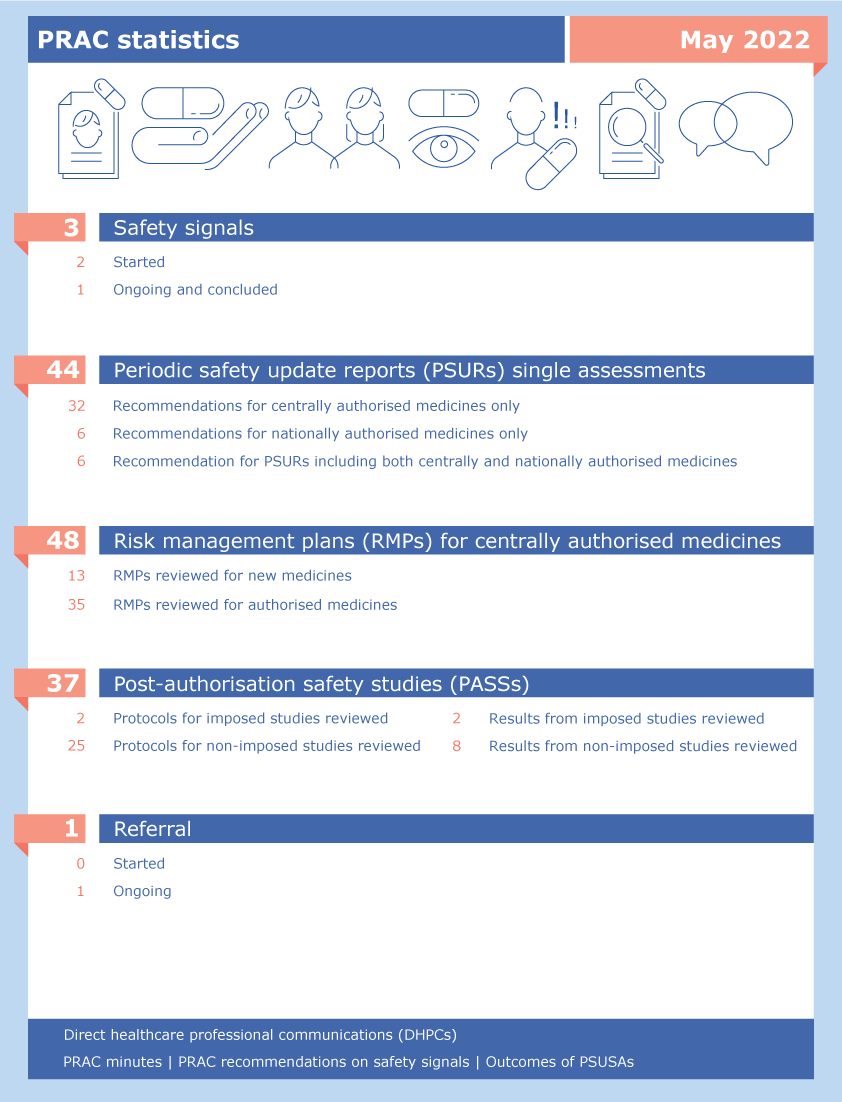At its monthly meeting, EMA’s safety committee (PRAC) carried out its broad range of responsibilities, which cover all aspects of the risk management of the use of medicines: assessment of safety signals, risk management plans, periodic safety update reports and post-authorisation safety studies. The Committee did not start or conclude any referral procedures. More information on all safety reviews currently under evaluation is provided in the ‘Ongoing referrals’ table. Information on all topics discussed by the PRAC is available in the agenda.
New safety information for healthcare professionals
As part of its advice on safety-related aspects to other EMA committees, the PRAC discussed a direct healthcare professional communication (DHPC) containing important information for Defitelio.
Defitelio: Should not be used for prevention of veno-occlusive disease (VOD)
This DHPC informs healthcare professionals about the result of a study which compared Defitelio (defibrotide) in combination with best supportive care (BSC) with BSC alone, when used for prophylaxis (prevention of) veno-occlusive disease (VOD) after hematopoietic stem-cell transplantation (HSCT). Prophylaxis of VOD is not an authorised indication for Defitelio.
VOD is a rare condition in which the veins in the liver become blocked and stop the liver working properly. VOD is usually a complication resulting from a treatment known as myeloablative chemotherapy given before HSCT. Defitelio is authorised to treat severe VOD in patients undergoing HSCT, in adults and in children from one month of age.
Results from a Phase 3, randomised, adaptive study (Study 15-007) conducted in 372 adult and paediatric patients, have been reviewed. The study was stopped after interim analysis as it showed that there is no benefit in using Defitelio for prevention of severe VOD after HSCT.
The most common side effects with Defitelio are hypotension (low blood pressure) and bleeding. Defitelio increases the risk of bleeding and should be withheld or stopped if significant bleeding occurs.
EMA’s human medicines committee, the CHMP, concluded on the need to communicate to health care professionals about these findings, which is supported by the PRAC. The PRAC has provided advice on the proposed DHPC. In view of the findings of the study and taking the safety profile of defibrotide into account, the PRAC considers it useful to inform health care professionals that Defitelio should not be used for prophylactic treatment of VOD.
The DHPC for Defitelio will be forwarded to the CHMP. Following the CHMP decision, the DHPC will be disseminated to healthcare professionals by the marketing authorisation holder, according to an agreed communication plan, and published on the Direct healthcare professional communications page and in national registers in EU Member States.
Agenda
PRAC statistics: May 2022

Glossary:
- Safety signal assessments. A safety signal is information which suggests a new potentially causal association, or a new aspect of a known association between a medicine and an adverse event that warrants further investigation. Safety signals are generated from several sources such as spontaneous reports, clinical studies and the scientific literature. More information can be found under 'Signal management'.
- Periodic safety update reports, abbreviated as PSURs, are reports prepared by the marketing authorisation holder to describe the worldwide safety experience with a medicine in a defined period after its authorisation. PSURs for medicinal products that contain the same active substance or the same combination of active substances but have different marketing authorisations and are authorised in different EU Member States, are jointly assessed in a single assessment procedure. More information can be found under 'Periodic safety update reports: questions and answers'.
- Risk management plans, abbreviated as RMPs, are detailed descriptions of the activities and interventions designed to identify, characterise, prevent or minimise risks relating to medicines. Companies are required to submit an RMP to EMA when applying for a marketing authorisation. RMPs are continually updated throughout the lifetime of the medicine as new information becomes available. More information is available under 'Risk-management plans'.
- Post-authorisation safety studies, abbreviated as PASSs, are studies carried out after a medicine has been authorised to obtain further information on its safety, or to measure the effectiveness of risk-management measures. The PRAC assesses the protocols (aspects related to the organisation of a study) and the results of PASSs. More information can be found under 'Post-authorisation safety studies'.
- Referrals are procedures used to resolve issues such as concerns over the safety or benefit-risk balance of a medicine or a class of medicines. In a referral related to safety of medicines, the PRAC is requested by a Member State or the European Commission to conduct a scientific assessment of a particular medicine or class of medicines on behalf of the EU. More information can be found under referral procedures.
- Summary safety reports have been introduced as part of the enhanced safety monitoring of COVID-19 vaccines. Marketing authorisation holders are required to submit these reports to EMA, starting on a monthly basis. Their submission complements the submission of PSURs. For more information see Pharmacovigilance plan of the EU Regulatory Network for COVID-19 vaccines.
Ongoing referrals
Procedure | Status | Update |
|---|---|---|
| Amfepramone-containing medicinal products - Article - 31 Referral | Under evaluation | PRAC continued its assessment |
| Janus Kinase inhibitors (JAKi) – Article 20 Referral | Under evaluation | PRAC continued its assessment |
| Nomegestrol and chlormadinone - Article - 31 Referral | Under evaluation | PRAC continued its assessment |
| Terlipressin-containing medicinal products-Article 31 Referral | Under evaluation | PRAC continued its assessment |